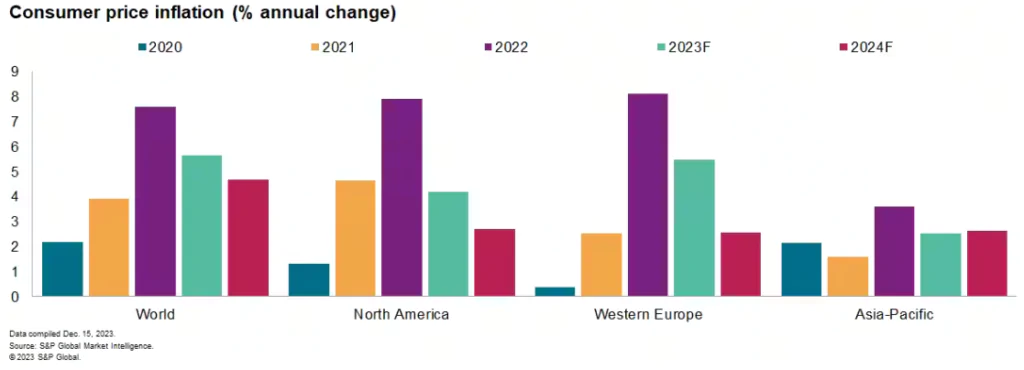The Power of Investing: Beating Inflation and Securing Your Financial Future
“Investing is the key to unlocking the doors of financial security, ensuring a future of abundance and opportunities.”

Introduction
In the world of personal finance, inflation is a powerful force that can affect your wealth. In this blog post, we will explore the concept of inflation, how to beat inflation and how it can erode the value of your money over time. We will delve into the various factors that contribute to inflation and explain how it is calculated. Additionally, we will discuss the importance of beating inflation and how investing can be a powerful tool in achieving this goal. By providing a small example, we will illustrate how investing can help you preserve and grow your wealth in the face of inflation. Finally, we will outline some of the best ways to beat inflation through strategic investment choices, offering practical tips and insights for readers to consider.
What is inflation?
Inflation refers to the rate at which the general level of prices for goods and services is rising, and, subsequently, purchasing power is falling. In other words, it is the rate at which the value of money is decreasing over time. Now, you might wonder, How is inflation calculated?. Well, Inflation is typically measured by the Consumer Price Index (CPI), which tracks the prices of a basket of goods and services over time. As per the S&P Global report, the Consumer Price Inflation’s downward trend has resumed and is expected to continue through 2024.

The CPI is calculated by taking the price of the basket of goods and services in a given year and dividing it by the price of the same basket of goods and services in the base year, then multiplying by 100. The result is the percentage change in the price of the basket of goods and services over time. Visit this link to see the latest global inflation rate.
Factors Fueling the Inflationary Fire

Several factors contribute to inflation, including:
- Increased money supply: When governments or central banks print more money, it dilutes the value of existing currency.
- Supply chain disruptions: Shortages of goods and resources can drive up prices due to limited availability.
- Rising production costs: Higher labor costs, raw material prices, and energy costs can be passed on to consumers as inflation.
What Does ‘Beating Inflation’ Mean?
Simply put, beating inflation means earning higher returns from an investment than the inflation rate in the economy. Inflation is the increasing cost of everything around you with the gradual decline in the value of your money. To understand this further, consider the cost of any staple in your home that you have been buying over the past few years and think about how that cost has increased over the years.
Why is it important to beat inflation?
Inflation can have a significant impact on your financial future. If you are not earning a return on your investments that is higher than the rate of inflation, then you are effectively losing money over time. For example, if the inflation rate is 3% and your investment is earning a return of 2%, then you are losing 1% of your purchasing power each year. Over time, this can add up to a significant loss of wealth.
Consider this example: Let’s say you have $10,000 to invest. If you invest in a savings account that earns 1% interest per year and the inflation rate is 3%, then you are effectively losing 2% of your purchasing power each year. However, if you invest in a mutual fund that earns an average return of 7% per year, then you are earning a return that is higher than the rate of inflation. Over time, this can help you preserve and grow your wealth.
How can investing help you beat inflation?
Investing can be a powerful tool in helping you beat inflation. By investing in assets that have a higher rate of return than the rate of inflation, you can preserve and grow your wealth over time. Some of the best long-term investment options that can help you beat inflation include:
“Investing has the incredible ability to not just overcome inflation but also ensure a secure financial future for an early retirement. It plays a crucial role in the FIRE (Financial Independence Retire Early) framework.“
1. Inflation-indexed bonds
These bonds are designed to provide a hedge against inflation. The principal amount of these bonds is adjusted for inflation, and the interest rate is paid on the adjusted principal amount. This means that the interest rate on these bonds will increase as inflation increases, helping you to maintain your purchasing power over time.
2. Mutual funds
Mutual funds are a great way to invest in a diversified portfolio of assets. By pooling your money with other investors, you can gain access to a wide range of assets that would be difficult to invest in on your own. Mutual funds are also managed by professional fund managers who have the expertise to make informed investment decisions.
3. Stocks
Stocks are another great long-term investment option that can help you beat inflation. Historically, stocks have provided a higher rate of return than other asset classes over the long term. However, stocks are also more volatile than other asset classes, so it is important to have a long-term investment horizon when investing in stocks.
4. Real estate
Real estate is another asset class that can help you beat inflation. Real estate investments can provide a steady stream of rental income, as well as capital appreciation over the long term.
5. Gold
Gold is often considered a safe-haven asset that can help protect your wealth during times of economic uncertainty. Gold prices tend to rise during times of inflation, making it a good investment option for those looking to beat inflation.
6. Debt funds
Debt funds are another great investment option for those looking to beat inflation. These funds invest in fixed-income securities such as bonds and provide a steady stream of income over time.
Remember:
- Diversification is key: Don’t put all your eggs in one basket. Spread your investments across different asset classes to mitigate risk.
- Start early and stay consistent: The power of compounding interest grows exponentially over time. The earlier you start and the more consistently you invest, the better.
- Seek professional advice: If you’re new to investing, consider consulting a financial advisor who can help you create a personalized investment plan based on your risk tolerance and financial goals.

Smart Investing Through the Ages
Tailoring your investment approach to your age is a smart move. In your 20s and 30s, embracing a bit more risk in your portfolio, like investing in stocks, can be rewarding. As you transition into mid-life and retirement age, the game plan shifts. It’s time to play it safe with a more conservative portfolio, focusing on fixed and risk-free investments. Dive deeper into the details by reading the article here.
Mastering Money Saving
Beyond savvy investing, mastering money-saving tricks is a crucial step in the journey to wealth and abundance. Think of these simple strategies as a magic toolkit that transforms everyday spending into savings, grows your wealth through intelligent investments, and strategically aligns your purchases with your financial goals. Establishing an emergency fund provides a safety net for unforeseen challenges, while exploring side hustles and effective debt repayment strategies not only boost your income but also liberate you from financial stress. Dive deeper into the details by reading the full article here
Conclusion
In conclusion, beating inflation requires a proactive approach, and investing emerges as a key strategy in this financial endeavor. By understanding the complexities of inflation, recognizing its impact on personal finances, and implementing strategic investment choices, individuals can safeguard their wealth and build a foundation for a secure and prosperous financial future. This blog aims to empower readers with the knowledge and tools needed to navigate the challenges of inflation and emerge as savvy investors in the pursuit of financial well-being.
Disclaimer: The investment strategies and options presented in this blog are intended for informational purposes only. Individual circumstances may vary based on factors such as financial situation and others. It is advisable to seek personalized advice from a subject matter expert or a financial advisor before making any investment decisions.








Thanks for sharing. I read many of your blog posts, cool, your blog is very good.
obviously like your website but you need to test the spelling on quite a few of your posts Several of them are rife with spelling problems and I to find it very troublesome to inform the reality on the other hand Ill certainly come back again.
Thank you for your feedback and for bringing this to my attention. I apologize for any spelling errors you encountered, and I’ll work on improving the accuracy of the content. Your input is valuable to me, and I appreciate your understanding. I’m committed to delivering high-quality content and hope you’ll continue to visit. Thanks again for your support!
Hi, I’m Jack. Your blog is a treasure trove of valuable insights, and I’ve made it a point to visit daily. Kudos on creating such an amazing resource!
Hi Jack,
Thank you so much for your kind words! I’m thrilled to hear that you find the blog valuable and make it a part of your daily routine. Your feedback truly motivates me to keep sharing more insights.
If there are any specific topics you’re interested in, I’d love to hear your suggestions. I’m always looking for new ideas to write about!
Thanks again, and I look forward to your thoughts.